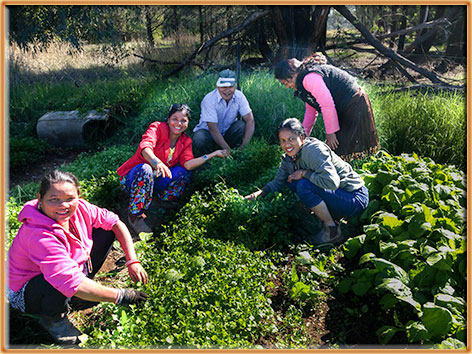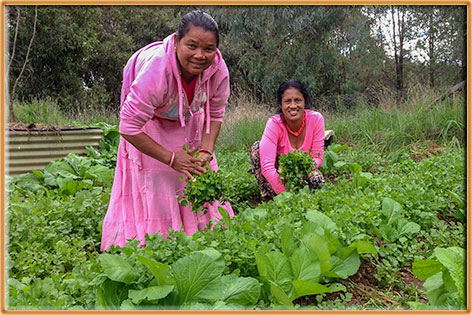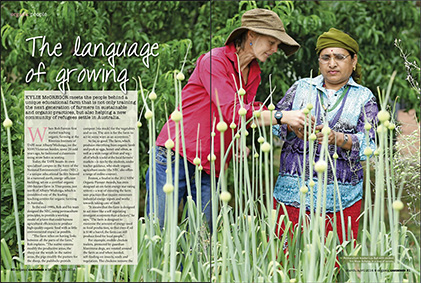Learning is one of the best things about ‘teaching’
/Further to the previous posts about my involvement with a class of students that combined English with permaculture (see here and here), I've been reflecting on what I learnt from these students and the classes. Plus it gives me an excuse to share a few more photos!
We received a lot of positive (and heart-warming) feedback about the classes from our students over the time I was involved (and that I'd heard prior to that), which is awesome. The aspect I didn't fully anticipate was how much I learnt from these studentsand teaching this class. And with funding changes that mean the class is not being offered this year (but maybe it will be again, sometime, or something in a similar form can be developed to 'tick the right boxes' to enable a reincarnation), I found myself reflecting on some of the lessons I learnt.
They say that a way to gauge that you've got your head around something when you can explain it to other people. I think you could add ‘particularly if you can explain it to an ESOL* class!' Developing materials and content for these guys really concentrated my thoughts as to what was important or not, and how to convey the messages in easy-to-understand ways. We used lots of repetition, 'doing' and pictures, in particular. Lou’s experience co-ordinating a primary school garden program, as well as the Australian organic schools materials, were really valuable here, though of course we tweaked things to best suit these adult learners.
The students would often note that time in the garden helped to give them something to do, rather than to ruminate on troubles or previous challenges they'd been through. In fact, many were pretty disappointed when TAFE holidays rolled around and they missed the class. Likewise, the resilience, cheerfulness and attitudes of these folks really gave me a refreshed perspective on my own life.

Feel like you're having a tough week? Think for a second about what some of these people have been through and yet how happy, and grateful they are to be here, to be building a better life, to the future they and their children will enjoy ... and suddenly my 'tough week' seems pretty pathetic.
Likewise consider how difficult it is to function in our society with limited English skills - to rely on others to negotiate the paperwork and requirements of the support systems; to get your licence, and even to eat well when the foods you're accustomed to preparing are either not available or prohibitively expensive. It is so easy to overlook these challenges, and they're just the tip of the iceberg.
Yet when working in the garden they sing, and they laugh and they dig like crazy and just want to plant more and more (especially mustard greens and coriander). And I couldn't help but laugh and smile along - their attitude is infectious!

Image: Picking coridander
I too learnt about other climates and growing conditions, as the students shared with us the climate, seasons and growing practices of Bhutan and Nepal. I improved my appreciation (and recipe collection) for mustard greens - although I don't ever expect to be as excited by them as most of these students are!

And of course, a big bonus was that I got to hang out in another garden, growing food and talking about all things garden-related, on a regular basis! It's also pretty impressive what you can achieve with 8 to 14 people all on the job/s at once; and how time flies as you do it.

Image: steam rises from the hot compost as Hari and Ruth turn it on a cold winters morning.
There are plenty of other examples, but I'm conscious I've already dragged this out more than I'd intended.
To read more about the history of this program, you might like to check out this Organic Gardener magazine article, along with sensational additional photos by local photographer Simon Dallinger of the class, garden and the NEC organic farm.

Image: Organic Gardener magazine, April/May 2014
This and many other programs also demonstrate how food gardens can help to educate and heal - be it for for health (mental and physical), healthy eating, and understanding food systems and connecting us to our environment and ecosystems. That's a lot of winners in my book. I hope we'll see this model of ‘practising English (and all the associated skills and benefits) through gardening’ used again, both locally and perhaps further afield.
A big thank you to TAFE for the opportunity to be involved, to those supported me (particularly Lou Bull and Sue Brunskill) and, to these students - may we all have the chance to learn from you, and to share your enthusiasm for the many privileges and opportunities we have, particularly those we can tend to take for granted.
--
*ESOL - English for Speakers of Other Languages


